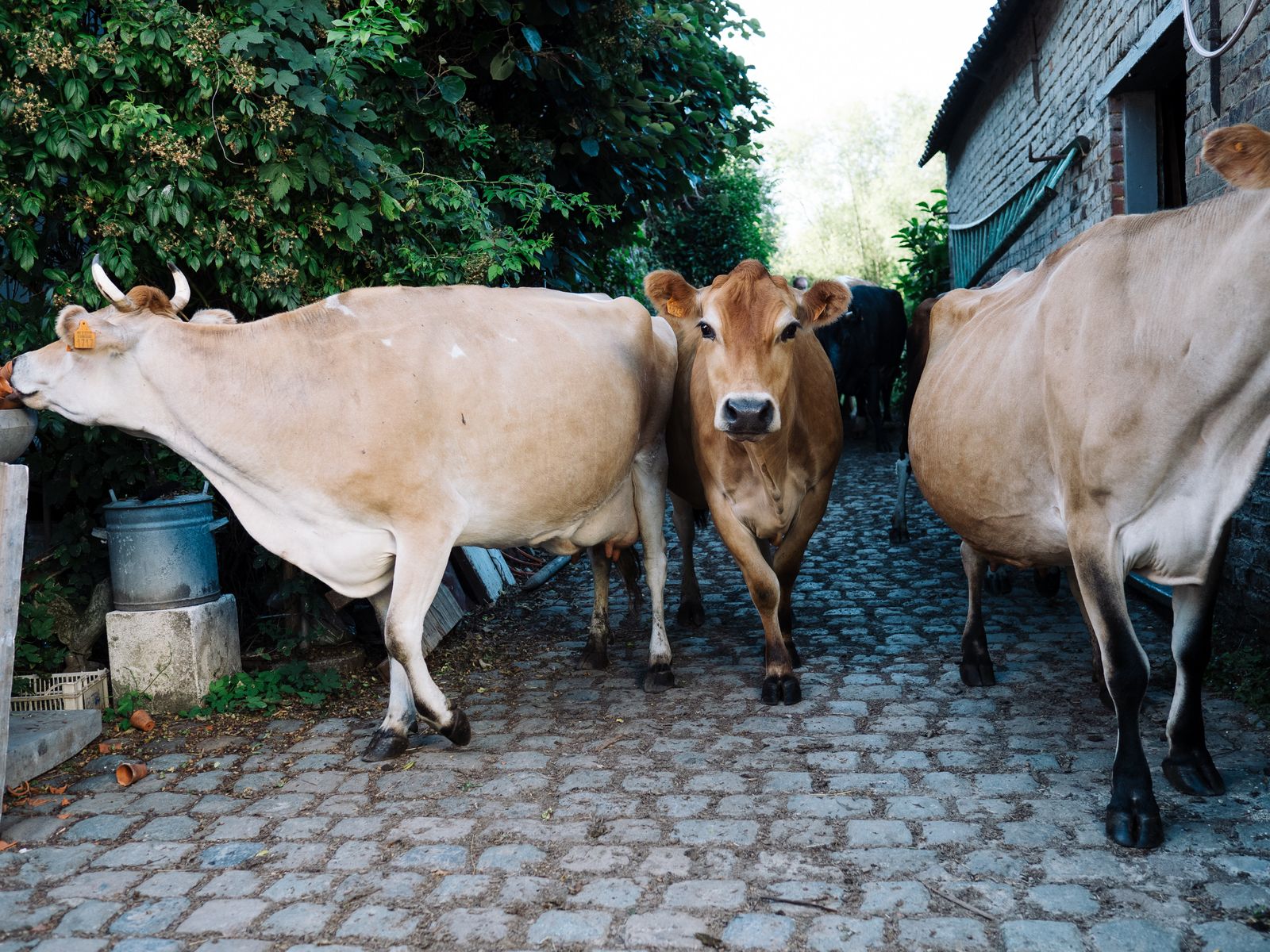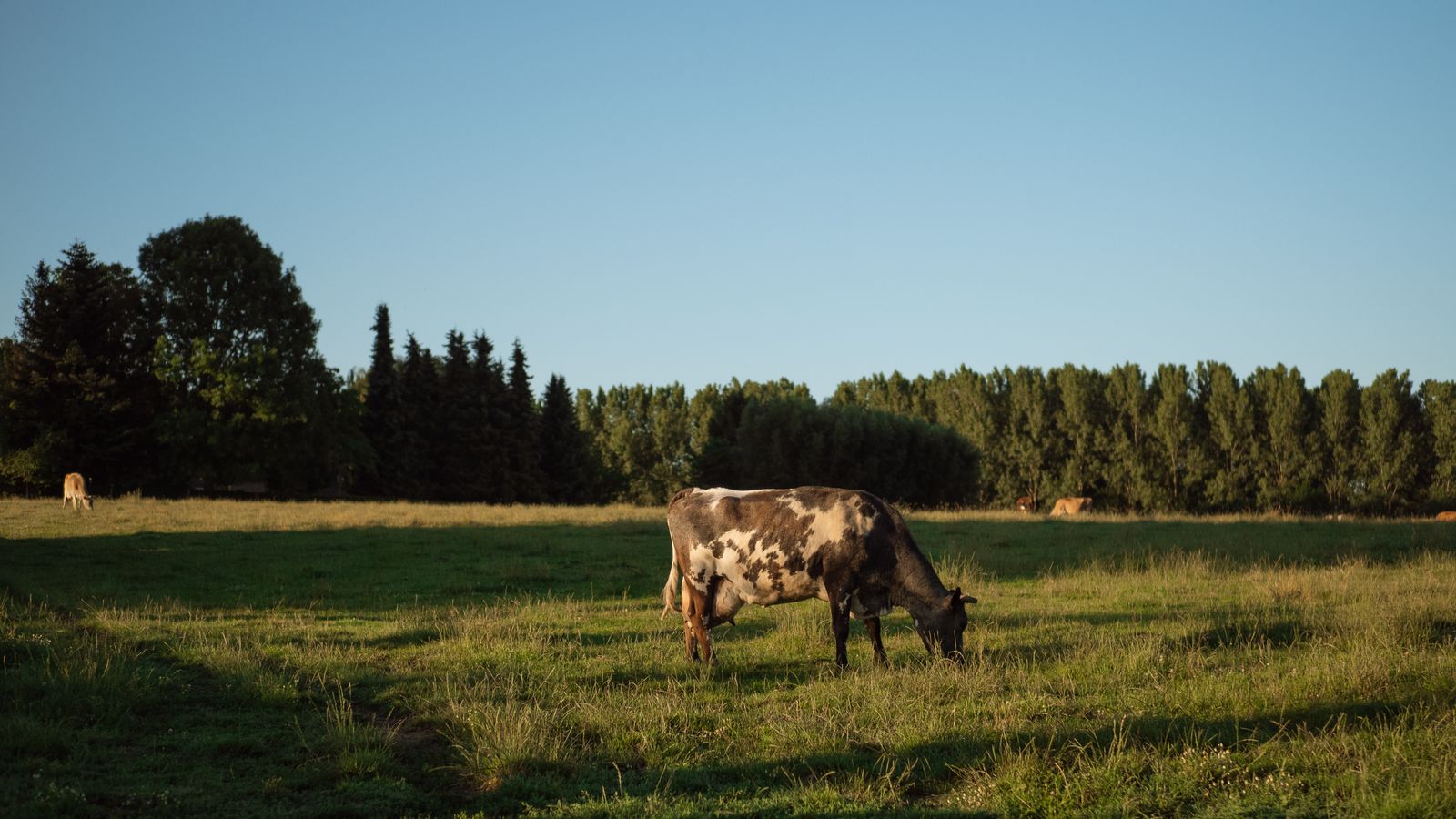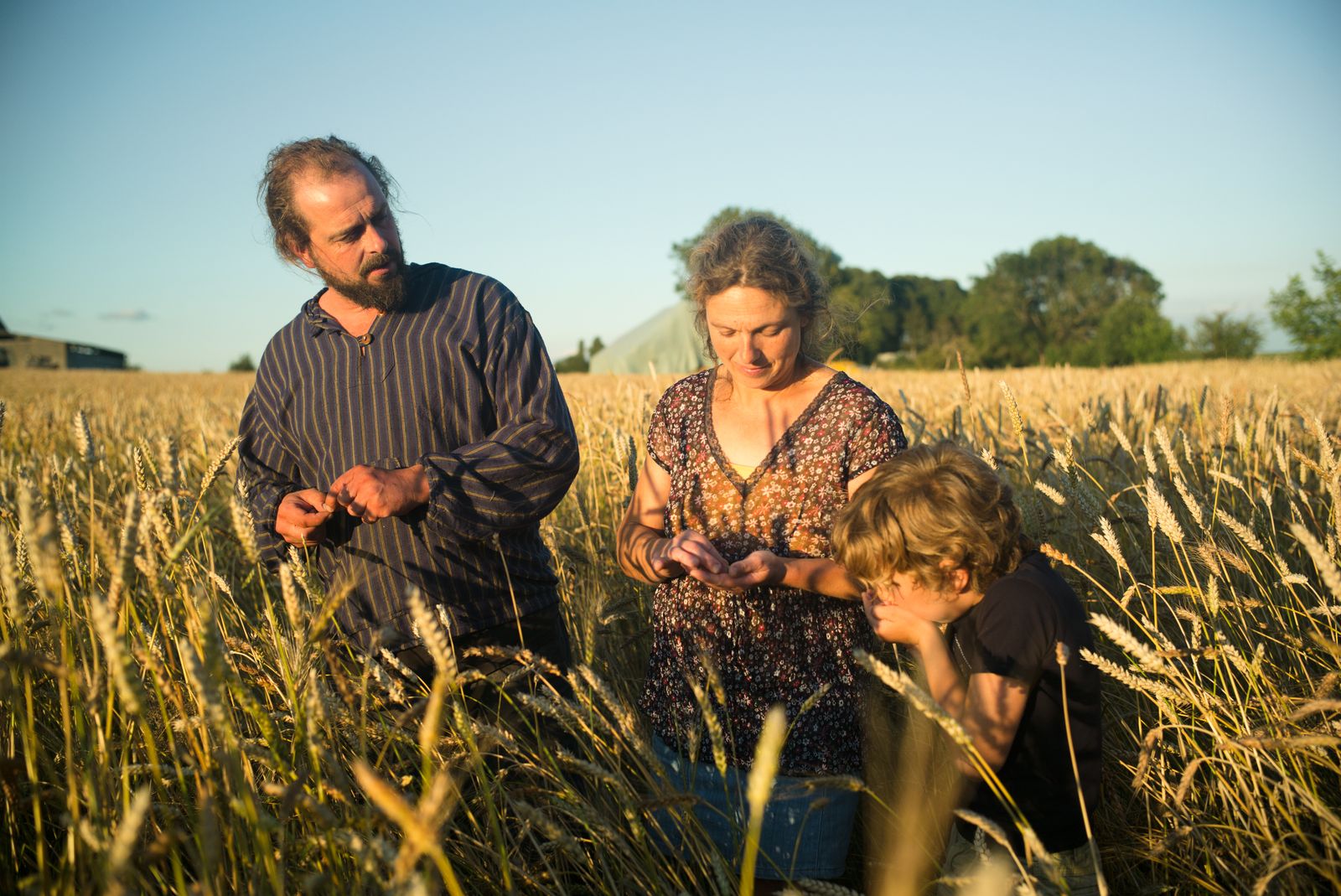‘Organic’ stands for more than just a package label, and Hilde Nechelput and Seppe Holmans are here to prove it. They are the driving force behind the Pajot organic farm Dubbeldoel. Their farm supplies grain to Brouwerij 3 Fonteinen and takes back draff in return. With a fancy word, you could call it circular economy — or you can just say it brings us closer to our very own terroir.
“Would you like some ice cream? Wait, I'll go get you one. Prefer the banana or the salted caramel?” The reception at the farming couple’s house is warm and genial without fail, so that includes a sweet treat. We are in Gooik, in Zwartschaapstraat, on a small road in the middle of the rolling Pajot countryside. Tucked away there lies the Dubbeldoel farm.
Hilde and Seppe are one of the farming families that 3 Fonteinen works with on a circular basis. They supply the brewery with excellent brewer’s barley and unprocessed wheat; the brewery then sends draff back to them. (The draff is what remains of the grain after brewing.) Their cows love it, since that mush is sweet, full of protein and rich in fibre. And the brewery then also buys cold meats and ice cream for their lambik-O-droom.
One cow is not like another.
The milk for the ice cream comes from their own cows. Hilde and Seppe have about 140 of them, including young stock. The adult animals are ‘dual-purpose’, meaning they provide both milk and meat. This principle used to go without saying. But since the industrialisation of agriculture, it has become very rare that farmers still look for the right breeds to maintain a healthy balance between milk and meat within the herd.

They also keep pigs on the domain and farm much of their 55 hectares as grazing land and for growing cereals and grass clover. Of their entire grounds, 20 hectares count as nature reserve. So the land also gets a double use. All in all, more than enough reasons to call the entire farm Dubbeldoel, which is Dutch for dual purpose.
“Aunt Godelieve was already working without pesticides and slurry. We just followed track with our natural management. We felt a genuine interest, there was no strategic masterplan or anything.”
It was in 2009 that Seppe and Hilde decided to take over the farm from Hilde’s aunt Godelieve. Hilde calls it an obvious choice. She already felt home there, having been raised on the farm as a little girl. The switch to an organic farm felt just as obvious. “Aunt Godelieve already worked with mechanical weed control instead of pesticides. And she was also using her own farmyard manure instead of slurry. We just followed track with our natural management of the pastures. We set hedges, planted orchards... This came naturally to us, we just had a genuine interest. There was no strategic masterplan or anything.”
Seppe’s was a different story. “At eighteen, you don’t really know what you want to do, do you? At first I even wanted to go into showbiz. But then your sweetheart happens to be on a farm all the time, and you gradually roll into it yourself.” Via a diversion to New Zealand, he eventually ended up in Gooik. “My adventure down there was all cool in terms of work, but in the end it was still an industrial farm with 1,200 cows. The scale of it all just didn’t feel right to me.”
The beautiful Pajotten-land.
A local story resonated all the more. Because Seppe still sees the Pajottenland as the granary of Brussels. “Here we are, you know, raising cows and driving the tractor, but we’re still kind of in a park in the outskirts of Brussels. The city is our customer. And the appreciation we get from the people there — that makes us proud.”
“You have no idea how many farms are being sold today to replace them with flats!”
And so the two of them carried on. Satisfied and convinced of organic farming. Moving on, their approach naturally resulted in some rare grass varieties on their pastures. “Maintaining those historically valuable meadows and landscapes was key, in my opinion,” he continues. “We went against the advice of certain specialists who had recommended re-seeding our land with crops that pay off immediately.” Seppe and Hilde went for grass clover instead, a conversion that would make the soil richer, rather than deplete it. “And we preserve our beautiful view as well. You have no idea how many farms are being sold today to replace them with flats!”

Traditional maize cultivation didn’t appeal to them anymore and they cut it out altogether. “This grass clover is incredibly important”, Hilde jumps in, “It is simply the best food that your cattle can get. A whole different story from maize and grass mixed with South American soy.”
“Organic farming is not just about production methods. It’s all linked to the landscape, animal care, social impact, you name it.”
It goes without saying that their choices have empowered the soil. But when asked about local organic farmers, Hilde is adamant. The few farmers who got on board are still there, thankfully. But only few of them are joining. “Currently, the supply of organic milk is greater than the demand. Hence, prices are under pressure and the market has become destabilised, especially due to the additional import of cheaper foreign milk.”
Seppe and Hilde are ploughing ahead.
Fortunately, Belgians do expect quality. People have also become more conscious about their food and therefore want to support the local farmer. “We also want to evolve towards full-fledged herd cows,” Seppe says. “That means we will leave the calves with their mothers for much longer, in line with their natural behaviour. It’s just the right thing to do. You know, organic farming is not just about production methods. It’s all linked to the landscape, animal care, social impact, you name it.”
“We were already growing some cereals and by now we have learnt a lot more, but let us tell you something: we are never going to be the most gifted cereal farmers.”
Here we are, talking to entrepreneurs who always launch their next project quite impulsively. Hilde will refer to this several times. “We do things mainly with our hearts. Maybe we have to plan just a bit more thoughtfully.” But should they indeed? Hilde and Seppe have a steady workflow, their small farm has seven employees by now, and their growing number of customers buys their products in six shops in and around Brussels, on about three markets, via home delivery and at their farm shop with their own cold meats, yoghurt and ice cream. This couple obviously knows how to get things done.

Just one more thing. How did Seppe and Hilde actually end up in the Cereal Collective? “Well, you guys first came to us, remember? Because there simply aren’t too many organic farmers around. We were already growing some cereals and by now we have learnt a lot more, but let us tell you something: we are never going to be the most gifted cereal farmers. But your draff is so important to us. And it’s nice to be able to say: ‘We helped along with that bottle of geuze’—definitely.”
The circular story has firmly taken root in their hearts. Seppe and Hilde sell grain, and they buy nutritious draff in return. Besides, the lambic brewing season alternates perfectly with the grass-clover season. And so, yet another story comes full circle.